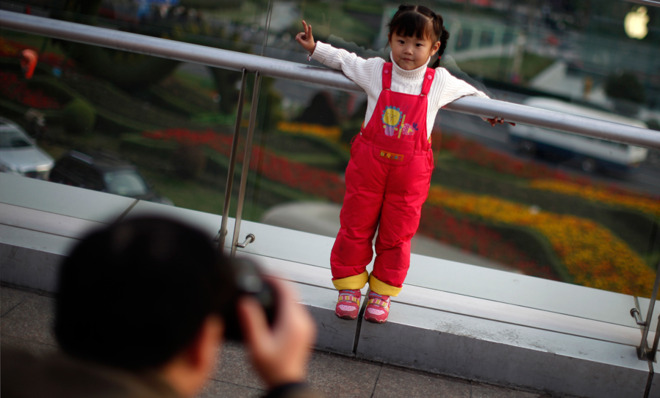The Chinese Communist Party should end the one-child policy — for its own sake
If ethical concerns won't force change, self-survival will

A free daily email with the biggest news stories of the day – and the best features from TheWeek.com
You are now subscribed
Your newsletter sign-up was successful
After more than 30 years, China will "fine tune" its one-child policy, writes San Juan at China Daily. Details haven't been released yet, but it's clear the government is considering ways to relax the restriction. That might be a wise idea: If the Chinese Communist Party wants to maintain economic growth and maintain its hold on power, an overhaul of the policy is a clear necessity.
Since the one-child policy was enacted, China has reduced the birth rate by about 400 million, a staggering decrease. Ethical qualms aside (and that's a huge aside), the government's policy of limiting births certainly played a role in allowing the country's economy to flourish while lowering the strain on national resources.
However, the policy has also led to some corollary repercussions that have the potential to drag down the economy. Due to the one-child policy, China has a whole lot of old people. That comes with a variety of negative effects, a major one being your workers start aging out without a young, healthy population to replace them.
The Week
Escape your echo chamber. Get the facts behind the news, plus analysis from multiple perspectives.

Sign up for The Week's Free Newsletters
From our morning news briefing to a weekly Good News Newsletter, get the best of The Week delivered directly to your inbox.
From our morning news briefing to a weekly Good News Newsletter, get the best of The Week delivered directly to your inbox.
Furthermore, once that "young and vibrant labor force transitions from contributing to China's economy," it "needs to draw resources out of the country's thinly supported pension and health care systems," writes Benjamin Shobert at CNBC. A growing elderly population without strong safety nets could be a financial and social disaster.
"Potential turmoil could spread across the country if families begin to feel all their hard work has not translated into better long-term care for elderly," Shobert adds.
But that instability is nothing compared to the upheaval that could be unleashed by China's angry bachelors. An obvious, though illegal, effect of the one-child policy is that couples are more likely to abort female babies, creating a huge gender imbalance. In 2006, there were 120 males to 100 females. As these babies have grown into adulthood and hit the marrying age, there's been an ironic reversal; women are now the preferred sex and are in high, high demand.
As with any high-demand item, the wealthy have the upper hand. The Titanic romance of Rose eschewing her rich fiancé for the poor, exciting, and handsome Jack doesn't hold a candle in China. As one female contestant on a Chinese dating show said, it's better to "cry in a BMW than laugh on the backseat of a bicycle." Ahh, romance.
A free daily email with the biggest news stories of the day – and the best features from TheWeek.com
As a result, there are many single and poor men who are being rejected by women and society at large. Unsurprisingly, they "feel aimless, angry, and alone," writes Jessica Levine at The Atlantic. "Fueled by sexual frustration, marginalized by neighbors, these islanded bachelors are increasingly likely to drink, fight, gamble, and frequent prostitutes."
Oh, and potentially rebel against the government. In the 19th century, when males outnumbered females 129 to 100 in the country's northern region, "roving young men organized themselves into bandit gangs, built forts, and came to rule an area of some six million people," wrote Martin Walker in Foreign Policy in 2006. Basically, the horsing around of yesteryear could take on more violent forms in maturity.
Plus, there are a bunch of them. We aren't talking about a few lonely hearts. Their total population is estimated at 40 million to 50 million. Even in a country the size of China, a group that large — let alone young and sexually and politically frustrated — could cause some major damage.
There's a good chance they wouldn't be alone. The selective enforcement of the one-child policy elicits anger among the majority of Chinese who fall outside of the wealthy and elite. If you have enough money to pay the fine or have a baby overseas with a foreign passport, you're free to violate the one-child policy. Unfortunately, this only exacerbates growing class tensions, which is exactly what the Chinese government doesn't want to happen.
The fact that the one-child policy is a glaring human rights violation never seemed to bother the Chinese government all that much. But now that it's increasingly clear that the restriction is possibly steering the country towards economic hardships and major social upheaval, the CCP may finally get with the program.
Emily Shire is chief researcher for The Week magazine. She has written about pop culture, religion, and women and gender issues at publications including Slate, The Forward, and Jewcy.
-
 ‘Restaurateurs have become millionaires’
‘Restaurateurs have become millionaires’Instant Opinion Opinion, comment and editorials of the day
-
 Earth is rapidly approaching a ‘hothouse’ trajectory of warming
Earth is rapidly approaching a ‘hothouse’ trajectory of warmingThe explainer It may become impossible to fix
-
 Health insurance: Premiums soar as ACA subsidies end
Health insurance: Premiums soar as ACA subsidies endFeature 1.4 million people have dropped coverage